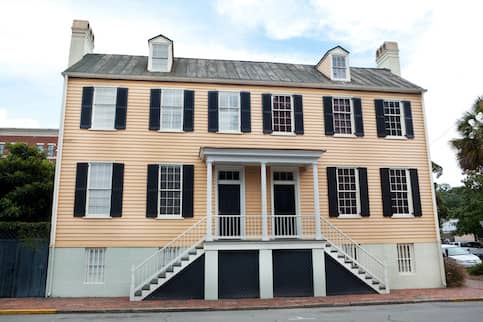Veterans Affairs loans are an attractive mortgage option for military veterans, active-duty service members and their eligible surviving spouses. They offer competitive interest rates and no down payment or mortgage insurance requirements but also require most VA borrowers to pay a funding fee. This one-time fee helps pay for the VA home loan program, ensuring these mortgages stay affordable.
Key Takeaways:
- The VA funding fee is a one-time fee paid on VA home loans.
- The funding fee reduces the program’s cost to U.S. taxpayers and ensures VA loans remain affordable.
- The amount you pay varies depending on your loan amount, down payment and whether you’re a first-time VA borrower.
What Is A VA Funding Fee?
The VA funding fee is a one-time payment that active-duty military service members, veterans or their surviving spouses must pay on a VA loan. The fee is designed to keep taxpayer costs for the loan low so these mortgages can remain available without requiring a down payment or mortgage insurance from eligible home buyers. Borrowers either can pay the full fee upfront or roll it into their loan amount and pay it off over time.
VA Home Loan Overview
The VA loan program provides affordable mortgages to qualifying borrowers. You’ll apply through a private mortgage lender, though the Department of Veterans Affairs guarantees the loan. Since the VA guarantees the loan, the lender takes on less risk and can offer more favorable terms, such as no minimum down payment or mortgage insurance requirements.
The VA determines who qualifies for a VA loan. If you believe you’re eligible, the first step is to obtain a certificate of eligibility, which confirms you can take out a VA loan.
What’s Your Goal?
Buy A Home
Discover mortgage options that fit your unique financial needs.

Refinance
Refinance your mortgage to have more money for what matters.
Tap Into Equity
Use your home’s equity and unlock cash to achieve your goals.
How Much Is The VA Funding Fee?
The VA funding fee ranges from 1.25% to 3.3% of the total loan amount. Let’s look at how the funding fee works and how the VA determines what you pay.
2024 VA Funding Fees
There are two factors the VA uses to determine your funding fee: your down payment and whether you’re a new or subsequent VA borrower.
Making a down payment of 10% or more lets you pay the lowest funding fee. First-time VA borrowers making a down payment of less than 5% will pay a lower funding fee than subsequent borrowers paying down the same amount.
Funding Fee For Purchase Or Construction Loans
| Down Payment | First-Time VA Borrower’s Funding Fee | Subsequent VA Borrower’s Funding Fee |
|---|---|---|
| Less than 5% | 2.15% | 3.3% |
| 5%-9.99% | 1.5% | 1.5% |
| 10% or more | 1.25% | 1.25% |
You also have to pay the VA funding fee on a refinance. If you get a VA cash-out refinance, the funding fee is 2.15% for first-time borrowers and 3.3% for repeat borrowers. For a VA Interest Rate Reduction Refinance Loan, known as an IRRRL or Streamline refinance, the funding fee is 0.5% across the board.
Funding Fee For VA Refinances
| VA Refinance Type | Funding Fee |
|---|---|
| Cash-out refinance, first-time VA borrower | 2.15% |
| Cash-out refinance, subsequent VA borrower | 3.3% |
| VA IRRRL | 0.5% |
How To Calculate The VA Funding Fee
To calculate your funding fee, review the charts above and simply multiply your loan amount by the percentage. For example, if you’re a first-time VA borrower buying a $400,000 home with no down payment, your funding fee will be 2.15% of the loan amount, or $8,600.
Ready To Become A Homeowner?
Get matched with a lender that can help you find the right mortgage.
Why Do You Have To Pay A Funding Fee For A VA Loan?
VA loans are among the most affordable since they don’t require a down payment or mortgage insurance. The funding fee is the only additional expense VA loan borrowers are responsible for. Here are a few reasons borrowers must pay the funding fee:
- It reduces taxpayer costs. The funding fee reduces the cost of the VA loan program to U.S. taxpayers.
- It keeps interest rates low. The funding fee allows the VA to offer competitive interest rates.
- It allows the VA to offer loans with no down payment or mortgage insurance requirements. The fee also lets the VA offer loans without mortgage insurance. The fee mitigates some of the risks usually covered by mortgage insurance.
How Is The Funding Fee Different From Mortgage Insurance?
The VA funding fee is a one-time payment made at closing, and it’s a requirement for all VA loan borrowers, with a few exceptions. The amount you’ll pay varies depending on your down payment amount, whether you’re a new or repeat VA loan borrower, and whether you’re buying or refinancing.
The VA funding fee functions as a replacement for mortgage insurance, which is an ongoing monthly cost. Mortgage insurance is required for conventional loan borrowers making a down payment of less than 20%, as well as all FHA loan borrowers, regardless of the down payment amount.
The amount you’ll pay for mortgage insurance depends on the type of loan you take out. For example, conventional loans come with private mortgage insurance, and the amount you pay is based on your credit score and down payment amount. Most conventional loans allow you to cancel PMI once you reach 20% equity in your home.
But if you take out an FHA loan, your mortgage insurance will cost the same regardless of your credit score, though the costs increase a bit for borrowers making a down payment of less than 5%. FHA loans require an upfront mortgage insurance premium that’s paid at closing, as well as an ongoing monthly cost. You’re unable to cancel mortgage insurance with an FHA loan unless your down payment was 10% or more, in which case you can cancel it after 11 years.
VA Funding Fee Exemptions
You won’t have to pay the funding fee if you qualify for an exemption. The following borrowers are exempt from paying the VA funding fee:
- Veterans and service members receiving compensation for a service-connected disability
- Anyone who’s eligible to receive compensation for a service-connected disability but who is receiving retirement or active-duty pay instead
- Surviving spouses of veterans who are receiving dependency and indemnity compensation
- A service member who has received a proposed or memorandum rating before the loan closing date stating they’re eligible to get compensation because of a pre-discharge claim
- Active-duty service members who have been awarded the Purple Heart
VA Funding Fee Refund
In some cases, borrowers may qualify for a refund on the VA funding fee after closing. For example, you may receive a refund if you file a disability claim that is approved after you pay the funding fee at closing. If you think you’re entitled to a refund, you can contact a VA Regional Loan Center.
Take The First Step To Buying A Home
Find a lender that will work with your unique financial situation.
How To Pay The VA Funding Fee
You’ll pay the VA funding fee at closing as an upfront payment that’s part of your closing costs or by rolling the fee into your mortgage. Let’s look at how both options work.
Pay Upfront
You can pay the VA funding fee upfront with the remainder of your closing costs. Most lenders prefer you pay with a cashier’s check, certified check or wire transfer, as these are the most secure payment types.
Add The VA Funding Fee To Your Closing Costs
Alternatively, you can roll the funding fee and closing costs into your loan and pay them off over time. If you do this, you’ll pay less money upfront, but your monthly payment will be higher, and you’ll likely pay more over the course of your loan.
VA Loan Closing Costs
In addition to paying the VA funding fee, you’ll also have to pay closing costs, which are set by your lender, as would be the case with any home purchase. These closing costs usually include the appraisal fee, loan origination fee, property taxes and homeowners insurance..
Closing costs usually cost 3% to 5% of the loan amount. So, if you’re buying a $400,000 home, you can expect to pay between $12,000 and $24,000 in closing costs. Fortunately, the seller is required to cover the following costs:
- Real estate commissions
- Brokerage fee
- Buyer broker fee
- Termite report (unless you’re refinancing)
You can negotiate with the seller to determine who pays for the remaining costs. In some cases, you may not have to pay the VA funding fee at all if the seller agrees to cover part of the closing costs.
FAQ
Here are answers to common questions about the VA funding fee.
The Bottom Line
Most borrowers have to pay a funding fee when they take out a VA loan, adding to the overall cost of the loan. However, the VA funding fee reduces the burden on taxpayers and allows VA loans to continue to offer mortgages with no down payment requirement. Keep in mind that you will still have to pay other fees and closing costs when buying a home – even with a VA loan.
More From Quicken Loans:

Jamie Johnson
Jamie Johnson is a Kansas City-based freelance writer who writes about a variety of personal finance topics, including loans, building credit, and paying down debt. She currently writes for clients like the U.S. Chamber of Commerce, Business Insider and Bankrate.












